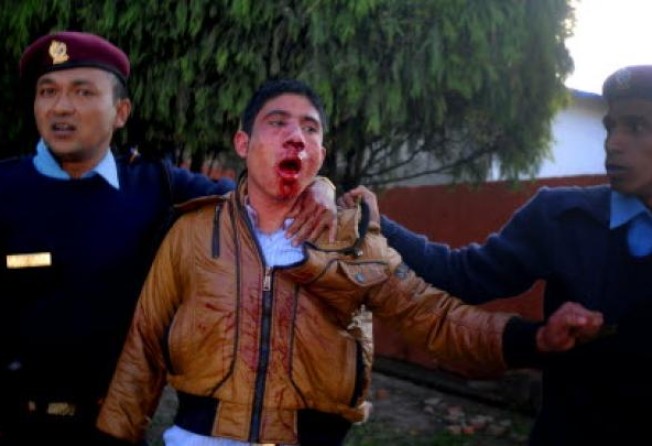
Nepali chef’s assault on Maoist leader reflects grassroots anger

Padam Kunwar might have expected infamy after assaulting Nepal’s Maoist leader but the young chef has instead become an unlikely emblem of the nation’s simmering frustration at its political overlords.
Social media users and bloggers have rallied behind the 25-year-old after he was arrested for slapping Maoist chairman Pushpa Kamal Dahal last week in an attack his family attributed to a sense of betrayal by the communist movement.
“My brother’s actions were the result of deep frustration against the Maoist party and the painful situation under which our family has been forced to live,” Kunwar’s sister Pratibha Kunwar, 28, said.
Dahal – better known as Prachanda, the leader of the Maoist insurgency which claimed more than 16,000 lives before a peace deal in 2006 – was left shaken on Friday when Kunwar slapped the ex-guerrilla across the face at a public function.
Police whisked Kunwar away after furious Prachanda supporters mobbed him and beat him up, yet public opinion outside the party has largely come out in his favour since details of his family’s support for the Maoists emerged.
Kunwar is the youngest son of a family of poor farmers and traders in remote, western Nepal which made huge sacrifices in support of the Maoists’ 10-year “people’s war” against the state.
Rebel leaders hailed the loyalty of grassroots supporters like the Kunwars when they became a mainstream political movement and were swept to power in nationwide elections in 2008.
But distrust among grassroots activists has been growing, fuelled by the revelations earlier this year that Prachanda had moved into a lavish mansion in the capital, and that the party offered his son US$250,000 to climb Mount Everest.
Prachanda was elected prime minister in August 2008, but resigned nine months later when his government collapsed in a row over the integration of former Maoist fighters into the national army.
Nepalese politics has been in flux ever since, with rival parties swapping control of the government several times and progress on writing a new constitution and investment in infrastructure hamstrung by political infighting.
“My father was repeatedly imprisoned for supporting the communist movement during the insurgency,” said Pratibha Kunwar, whose elder brother Tek Bahadur still suffers health problems from wounds suffered as a Maoist commander in the war.

Kunwar, just nine when the conflict began, fled to India and later Qatar, finally returning to his Nepalese village after the conflict and becoming a popular local activist, although he has never been a Maoist party member.
A trainee chef at the five-star Yak and Yeti hotel in Kathmandu before his arrest, Kunwar often voiced frustration over the lavish lifestyle of party apparatchiks he believed had sold out and forgotten their revolutionary roots.
“He used to complain that they had strayed from their duty to work for the people and had failed to deliver a new constitution for the country. He was depressed over our leaders’ failure to improve themselves,” Pratibha said.
Kunwar is in police custody accused of committing a public order offence and could be kept under lock and key for 35 days before being allowed a court appearance.
“His decision to slap the party chairman was wrong and socially unacceptable. But it shows the anger of families whose loved ones were killed or wounded or disappeared during the war when they fought for the Maoists,” his brother-in-law Bhim Bharati told reporters.
A Maoist statement blamed Kunwar’s actions on “extremists” whom it said were part of a conspiracy to destabilise Nepal’s fractious peace process.
But local media have represented the assault as emblematic of the public’s disdain not just for the Maoists but for the political class as a whole.
“If Facebook comments and letters to the editor are any guide, Kunwar has found many supporters for his ‘courage’,” the Republica daily observed.
“The consensus among Kunwar’s sizeable group of backers seems to be that the politicians responsible for the current state of the country deserve no less.”
A Facebook page has attracted more than 1,200 supporters while an official Padam Kunwar online campaign is demanding his release and people have taken to Twitter to back their new hero.
“Only if Padam Kunwar had managed to punch the rest of the idiots sitting [on] the podium, tomorrow would have been declared a holiday,” tweeted Kathmandu-based financial adviser Prasanna KC.